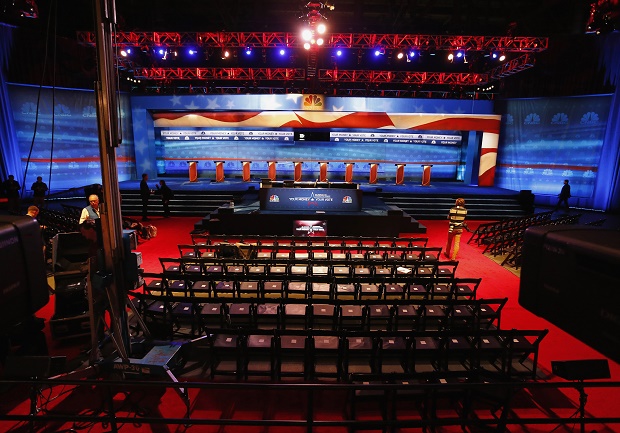
Crews prepare the venue for the Oct. 28 CNBC Republican presidential debate, Tuesday, Oct. 27, 2015, inside the Coors Events Center at the University of Colorado in Boulder, Colorado. Republican presidential candidates taking the debate stage Wednesday in Colorado are hoping to carry momentum from a 2014 US Senate victory in this toss-up state where independent voters outnumber the electorate from both major parties. AP
BOULDER, Colorado — Insurgent presidential candidates Donald Trump and Ben Carson defended the seriousness of their White House bids under tough questioning as the third Republican debate opened Wednesday.
Floridians Jeb Bush and Marco Rubio clashed for control of the party’s more mainstream wing in the debate, which comes some three months before the first votes are cast in the race, leaving much time for things to change.
Bush, who has done poorly in the polls, targeted Rubio, a first-year senator, for his spotty voting record on Capitol Hill since launching his presidential bid.
“You should be showing up to work,” said Bush, the one-time Republican front-runner who has struggled to gain traction in a race where voters appear eager for an outsider.
Rubio, who has had a close relationship with Bush, responded sharply: “Someone has convinced you that attacking me is going to help you.”
Trump, a billionaire businessman, dominated in the polls for months, but Carson has had the momentum lately and overtook Trump in polls in Iowa, where the first of the state-by-state contests will be held. Neither Trump nor Carson are career politicians but both have capitalized on anti-Washington, anti-establishment feeling among many conservatives.
Trump bristled when asked by a debate moderator if his policy proposals, including building a wall along the U.S.-Mexico border and deporting everyone who is in the U.S. illegally, amounted to a “comic book” campaign.
“It’s not a very nicely asked question, the way you ask it,” Trump responded. Then he defended his proposals as reasonable.
READ: Trump: Dad’s ‘small loan’ of $1 million got him started | Carson, Trump request Secret Service protection
Carson, a soft-spoken retired neurosurgeon, stuck to his low-key style and sought to explain his vague tax policy, which he has compared to tithing, in which families donate the same portion of their income to their church regardless of how much they make.
Carson said in an earlier debate that someone making $10 billion would pay $1 billion in taxes. Wednesday night he floated the idea of a 15 percent flat rate. Critics have questioned whether the government could still raise enough revenue under that type of flat tax system to pay for federal programs.
Hillary Rodham Clinton, former first lady and secretary of state, is the overwhelming favorite for the Democratic nomination. Her candidacy received a boost by a strong debate performance two weeks ago.